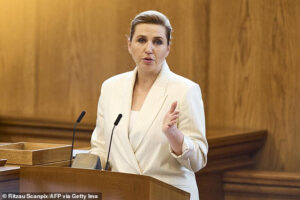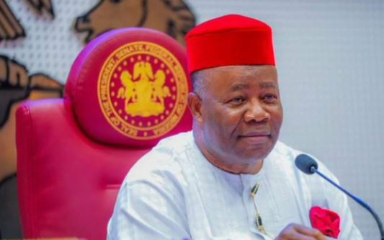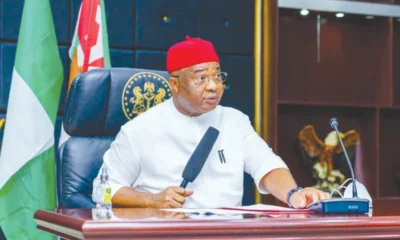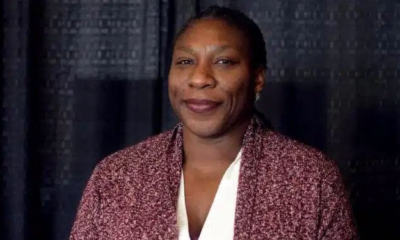News
Denmark raises retirement age to the highest in Europe, sparking fury

Denmark is set to raise the retirement age to 70 – a move that has been heavily criticised by to-be pensioners.
The Scandinavian country has tied the new retirement age to life expectancy, only affecting those who were born after 1971.
The cap will rise from the current retirement age of 67 to 68 in 2030 and then to 69 in 2025.
Tommas Jensen told Danish media ‘we’re working and working and working, but we can’t keep going’.
‘I’ve paid my taxes all my life. There should also be time to be with children and grandchildren.’
The 47-year-old roofer went on to say the move was ‘unreasonable’ and highlighted the difference between working a desk job and jobs that are demanding of the body.
The Danish government has been revising the retirement age every five years for the last two decades, with this new rule passed through their parliament yesterday 81 votes in favour to 21 against.
But the Social Democrat Prime Minister Mette Frederiksen has previously said these numbers would be renegotiated.

Social Democrat Prime Minister Mette Frederiksen has previously said her party believed ‘you can’t just keep saying that people have to work a year longer’

But the Danish government are set to raise the retirement age to 70 after passing through the new law yesterday 81 votes in favour to 21 against
She said: ‘We no longer believe that the retirement age should be increased automatically.’
She added that her party believed ‘you can’t just keep saying that people have to work a year longer’.
Protests have been taking place in Copenhagen over the last few weeks as trade unions stood against the new changes.
The chairman of a Danish trade union confederation, Jesper Ettrup Rasmussen, said ahead of the vote on Thursday that the proposal was ‘completely unfair’.
‘A higher retirement age means that [people will] lose the right to a dignified senior life.’
‘Denmark has a healthy economy and yet the EU’s highest retirement age,’ he added.
Retirement ages across Europe have been rising in recent years to meet budget deficits as well as the improved life expectancy.
Brits born between 6 October 1954 and 5 April 1960 can begin to receive their pension from 66 but this will raise to 67 for people born after this period.

Critics have said ‘I’ve paid my taxes all my life. There should also be time to be with children and grandchildren’
This could increase as the State Pension age will also be repeatedly reviewed in the UK to address longer life expectancy.
By comparison, people in Sweden can start claiming pension benefits from 63.
But for those living in Italy, they will have to wait until they are 67 to receive their pension.
News
Man in shock after lady he lodged with in a hotel in Abuja flees with his car and other valuables

A Nigerian man is currently in shock after a young lady identified as Precious Chinyere , whom he took to a hotel in the Asokoro area in the FCT for a romantic getaway allegedly fled with his car and other personal belongings on Thursday, February 5,
The distraught man and Precious had visited the hotel and opted for a short time stay. Things took a different in the evening when the man noticed Precious had left the hotel room without notifying him and took along with her some of his personal belongings including phones and laptop and also his car.
The victim immediately reported the incident to the police.
When contacted, the spokesperson of the FCT police command, SP Josephine Adeh, told LIB that the matter is currently being investigated and that efforts are being made to apprehend the suspect.
News
US Reacts As De@th Toll In Kwara Terror Attacks Hits 200

The United States Mission in Nigeria has condemned the k!lling of more than 200 civilians in recent attacks on communities in Kwara State.
Recall that terrorists launched de@dly attacks on Woro and Nuku communities in Kaiama Local Government Area of the state on Tuesday night, k!lling unsuspecting citizens.
It was gathered that the gunmen invaded the villages, opened fire on residents and burned homes.
According to reports, the de@th toll from the unfortunate incident hit 200 on Thursday night.
Reacting, the US Mission Nigeria condemned the k!lling via a post on its official X handle.
The post reads, “The United States condemns the horrific attack in Kwara state in Nigeria, which claimed the lives of more than 160 people, with the de@th toll still unconfirmed and many still unaccounted for.
“We express our deepest condolences to the families of those affected by this senseless violence.
“We welcome President Tinubu’s order to deploy security forces to protect villages in the area and his directive to federal and state officials to provide aid to the community and bring the perpetrators of this atrocity to justice.”
News
“I’ll never settle for a barber, yahoo boy or a poor man” — nail tech’s list of men she says she can’t marry sparks reactions online

A Nigerian nail technician has set social media talking after openly listing the kind of men she says she can never settle for.
In a now-viral post, she stated clearly that she refuses to “settle for less” and went on to mention professions and traits she considers a no-go area.
According to her, she can never settle for a barber, an aza man, a yahoo boy, a mechanic, an actor, a laundry man, a hype man, or a plumber. She also added that she wouldn’t marry a man with a high body count or a poor man.

-
Business1 year ago
US court acquits Air Peace boss, slams Mayfield $4000 fine
-

 Trending1 year ago
Trending1 year agoNYA demands release of ‘abducted’ Imo chairman, preaches good governance
-

 Politics1 year ago
Politics1 year agoMexico’s new president causes concern just weeks before the US elections
-

 Politics1 year ago
Politics1 year agoPutin invites 20 world leaders
-

 Politics1 year ago
Politics1 year agoRussia bans imports of agro-products from Kazakhstan after refusal to join BRICS
-
Entertainment1 year ago
Bobrisky falls ill in police custody, rushed to hospital
-
Entertainment1 year ago
Bobrisky transferred from Immigration to FCID, spends night behind bars
-
Education1 year ago
GOVERNOR FUBARA APPOINTS COUNCIL MEMBERS FOR KEN SARO-WIWA POLYTECHNIC BORI













